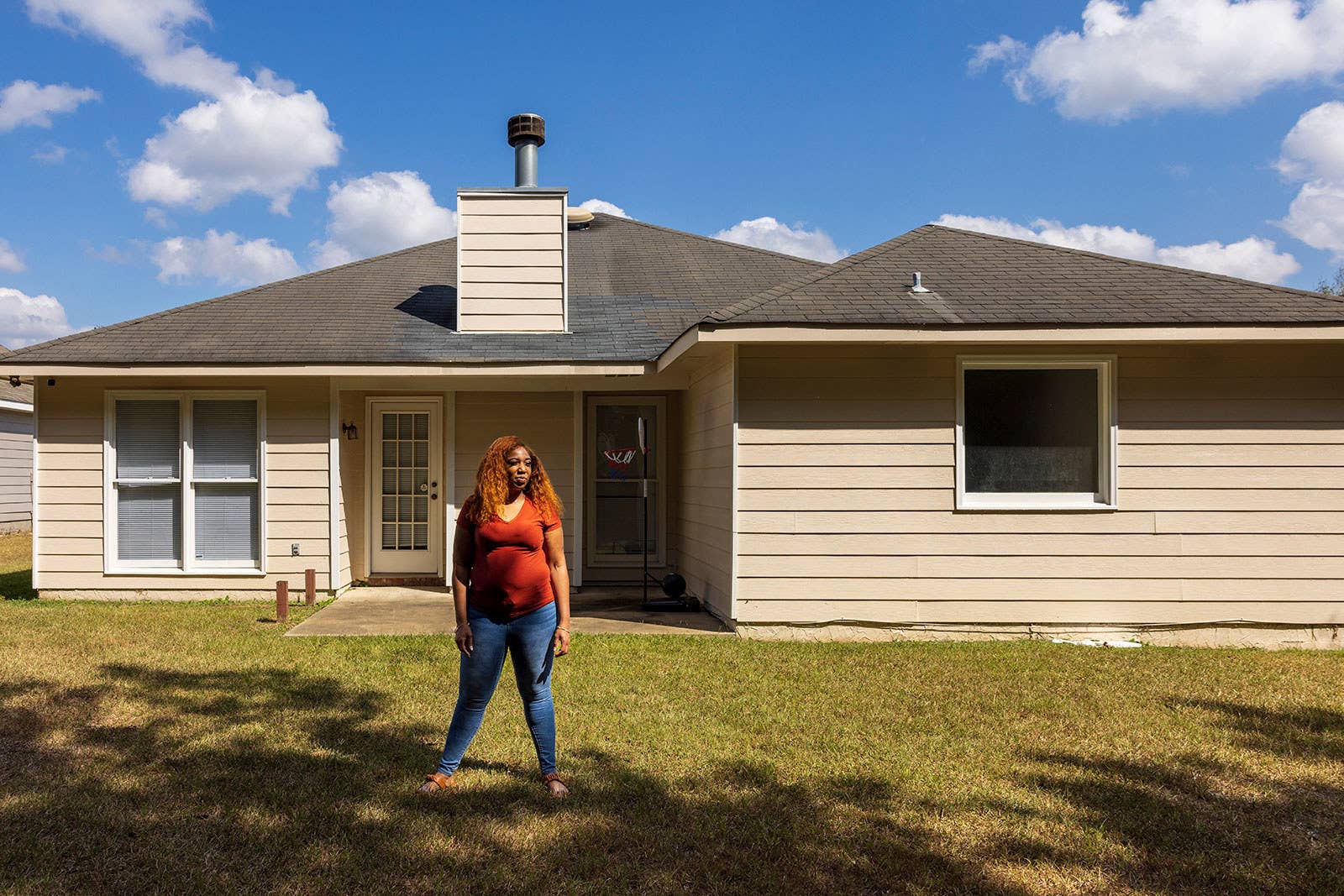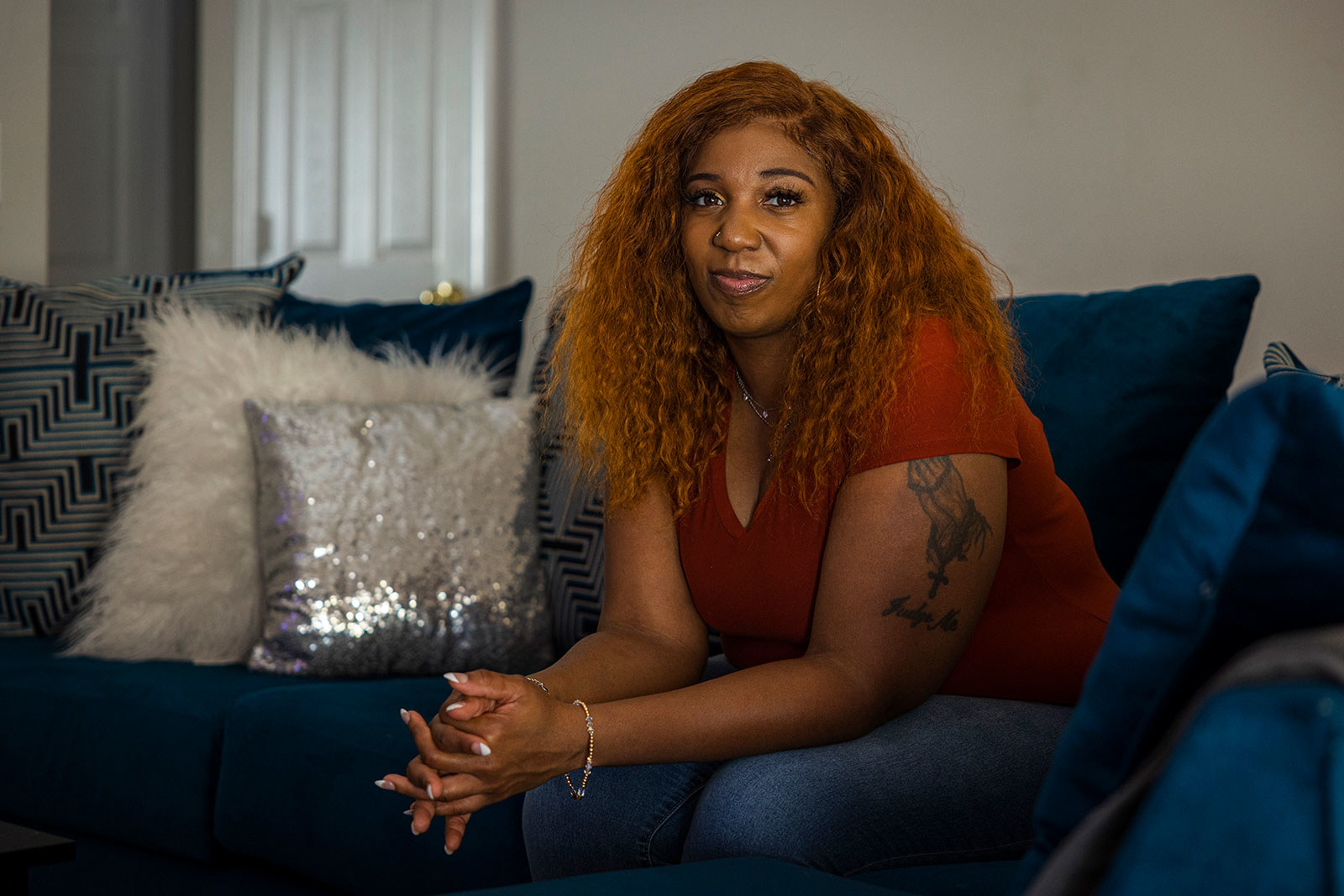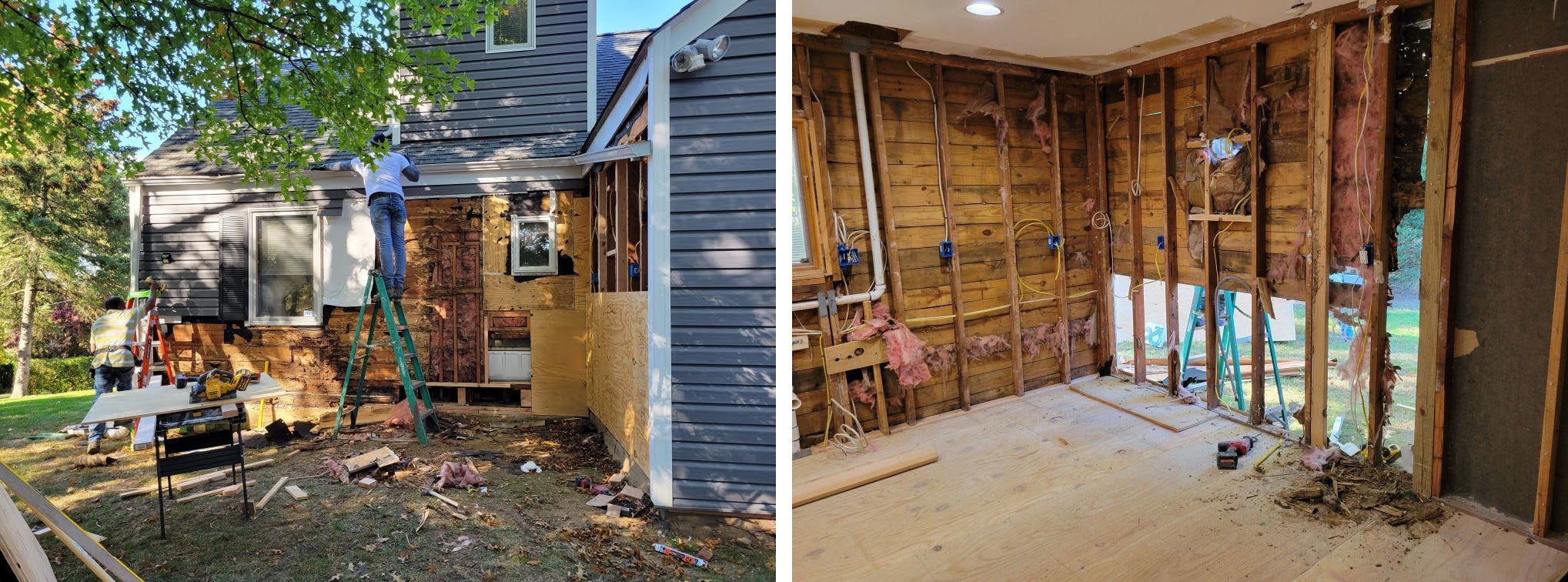
Christen Riggins had 30 days to move after her landlord’s management company told her they were selling the home she was renting with her three children. Unable to find an affordable rental in time — rents in Columbus, Georgia, were rising — Riggins ended up moving her family into a hotel, uncertain of what to do next. She had been preapproved for a mortgage about a year earlier at a rate near 3.5%, so she started to look more seriously at buying. “I said, ‘Well, if I'm gonna pay this rent, I might as well buy,’” she told BuzzFeed News. Like many people caught in the latest home buying rush, however, Riggins, who processes medical claims for work, was repeatedly outbid. Her agent said she would have to go above a home’s asking price if she wanted to close a deal.
The last two years have been a chaotic and frustrating time for many buyers, as low mortgage rates, and record high rents stirred up an unprecedented hysteria to own a place to live, still an enduring component of the American Dream. It led to feverish bidding wars, hasty closings, and poor (or even waived) inspections, all propelling home prices to new highs. Then the Federal Reserve hit the brakes in response to inflation. Mortgage rates spiked in 2022, cooling the housing market and suddenly making homeownership even more unaffordable for many. Investors now expect home values to drop in 39% of US cities next year.
As the frenzy tapers off and the economy seems to be moving toward another recession, some people who bought at the peak regret buying properties that now seem overpriced. BuzzFeed News heard from people around the country who bought a house in the last two years and said they now regret it financially. Overall, they described feeling trapped by rising housing costs — no matter if they rented or bought — and having little leverage against landlords, sellers, and banks: Many ended up in multiple bidding wars against other buyers and felt the price they closed at was ultimately too high, but did not see another option, as rents were also rising. Some who bought in the early months of the pandemic relied on video tours before closing, because COVID restrictions prevented them from entering their future houses (or touring them for as long as they would have liked). They later found costly problems with their homes that were not identified by their inspectors, whom they often met through their agents or lenders and who they felt did not protect their interests. Meanwhile, home repairs have been slow and expensive due to pandemic-related supply chain issues and labor shortages, and financing repairs is challenging when home values are set to decline.
All these factors have left these owners wondering whether it was worth it after all. “I almost feel like it’s a scam or a trick to get me more into debt. I worked so hard to get my credit up to even be able to apply for a mortgage,” Riggins said. Homeownership is “almost another way to keep people under.”
In May, Riggins’s $202,000 offer on a three-bedroom home with a yard was accepted — but interest rates were rising. “I started to back out so many times, especially when I was going through those bidding wars, and even with this, I didn't feel good about bidding that much,” she said. “I'll never forget when [my agent] did the paperwork and turned it in. I didn't get any sleep at night. ... I remember calling her the next morning and was like, ‘I'm thinking about backing out; maybe I should just find a place to rent.’” Riggins said that the agent reminded her that a home is an investment, that when rates were lower she could refinance, and suggested she “cut corners somewhere” or “try to pick up a part-time job.”

Riggins tried her best to shake off her nerves and moved ahead with the sale. It was a relief to finally be able to move her kids out of the hotel, but by the time she closed in July, her mortgage rate was 6%, setting off a chain of financial consequences she was unprepared for. “I feel like I bought more problems,” she said.
Riggins’s monthly rent had only been $800 a month; her mortgage payment for a home of the same size is about $1,500. The house also needed repairs that her inspector did not catch. None of the kitchen appliances worked. There were electrical issues. The roof needed to be fixed. She found mold under the cabinets. “I feel like I was really screwed over and put in a really bad space,” she said.
Riggins depleted her savings and has nearly maxed out her credit cards, which she previously kept only for emergencies. She downsized from an SUV to a sedan to reduce her car payments. Riggins is getting by paycheck to paycheck now, and earning extra money by working for Instacart and renting out her car. Still, there was no wiggle room to take her daughter out for her birthday this year.
Record housing prices and rapidly rising interest rates have many people questioning the value and viability of homeownership. The median home sale price in the US has jumped by 34% to $440,300 in mid 2022 from $327,100 at the end of 2019. Meanwhile, mortgage rates rose this year to 6.7% from about 3.7% at the end of 2019. By this summer, “a home purchase was unaffordable for a typical first-time buyer intending to purchase a typical home,” according to the National Association of Realtors. Funding necessary repairs beyond the mortgage payments, while the prices of everyday goods continue to climb, has many new homeowners stretched thin.
“The house is a lemon,” said Joshua Wingett, who bought a four-bedroom home 40 minutes outside of San Diego in April for $730,000 ($31,000 over asking) after losing out on seven other houses. Wingett and his husband are now dealing with about $20,000 in repairs. “Did we have a choice?” he said. They had been living with a friend and needed to move, “whether it be renting or buying.” Knowing that interest rates were expected to rise, which would price them out, they made the decision to buy. “We did what we could to get the best we could,” he said. “It’s costing us 55% of our income and it sucks to have no free spending money, but at least we have a roof over our head.” Wingett plans to refinance if mortgage rates decline and is considering renting out rooms to make ends meet.
This spring, after TJ Grace’s landlord gave notice of a rent increase, she bought a house with her wife and the two friends they were living with. “By the time we would look at something, it had basically already been sold,” she said. They found a 1,900-square-foot home in the nearby neighborhood of Lakewood, Washington. It was noticeably smaller than the 3,000 square feet they had been renting, but at $519,000 with a 4.9% mortgage rate, it was what they could afford. “Landlords can charge whatever they want,” Grace said, but owning hasn’t been any easier for them.
While her monthly mortgage payments are about as much as her rent was, necessary repairs to the roof ended up costing $65,000, much more than the $12,000 to $17,000 the inspector had estimated before the sale closed. Meanwhile, Grace had quit her job as an administrative assistant in September 2021, one of many who left their jobs during last year’s Great Resignation, and has not yet found a new job, even after submitting nearly 200 applications. She works as a nanny now but is still job hunting, and her wife is a cleaner; they split their housing costs four ways with their friends. “We’re just house poor now,” she said.
Those who bought at the peak of the market have no equity in their house when values fall, and therefore cannot borrow against their homes' value to manage unexpected maintenance and repair costs. “That leaves them using cash or other forms of loans,” said Eric Roberge, founder of Beyond Your Hammock, a financial planning firm that works with people in their 30s and 40s with families.
“You should really be thinking about this in terms of having cash set aside upfront for any issues ... rather than trying to finance that,” said Jeremy Bohne, a financial advisor and founder of Paceline Wealth Management. “There are options to finance this. That doesn't mean they’re good ones.”
The rule of thumb about how much to save for unexpected repairs varies based on the condition of the home and an owner’s financial circumstances. Jason Blumstein, CEO of Julius Wealth Advisors, said he typically tells owners to save 1% to 4% of a home’s value each year for housing expenses. L.J. Jones, a financial planner and founder of Developing Financial, put it at $1 for every square foot per year.
Roberge advises setting aside 2% of the value of a home each year on maintenance and repairs, although he also acknowledged, “It’s a difficult time. And not everyone can follow these rules of thumb.”
Experts also advise that homeowners think of their housing fund as separate from their emergency fund, which should be enough to cover three to six months of expenses in case of unemployment. “It may be prudent for a homeowner who wants to protect themselves a little more from the unexpected to have a 12-month cash reserve rather than a three-to-six-month reserve,” said John Boyd, founder of MDRN Wealth.
Still, home repairs can quickly deplete savings, even when they seem ample. BuzzFeed News spoke with other homeowners who were unable to thoroughly inspect their homes before closing due to health and safety restrictions during the early months of the pandemic and who are now dealing with tens of thousands of dollars in unexpected costs.
In Westchester County, New York, Sarah H. had bought a house for $670,000 ($11,000 above asking) in mid-2020, when pandemic restrictions only allowed her and her fiancé 20 minutes to view the property and prohibited them from bringing anyone with them for a second opinion. “The sellers weren't the easiest people to work with,” she said. Their inspector went in to see the house separately, finding some asbestos and some old termite damage. Sarah had to push hard for the sellers to let in a termite inspector — a “red flag,” she later realized. “I think he was rushed.” He told her the house was fine, but “turns out we have horrible, horrible termite damage.” Renovating the kitchen, originally estimated to be a $40,000 project, would now cost $80,000 because of the damage the termites had wrought in that room alone. “We know that the termite damage continues on throughout the house… that’s only getting worse with time,” Sarah said.

While Sarah still loves the house, the financial impact has been hard to deal with. Payment for repairs has been coming from an inheritance, savings, and credit cards, but the couple has also had to deal with a shortage of supplies due to the pandemic. “What really sucks are the projects we know we have to do, but we can't get to right now,” she said. The basement floods and the skylight in the upstairs bathroom leaks. The neighbors “honestly just feel bad for us,” she said. While she has looked at taking legal action against her inspector, she was told by friends and colleagues it would be too costly to pursue and difficult to win.
Sarah, who is an academic, said she and her fiancé, a researcher, had set aside a sizable amount for emergencies, about $40,000. But it just wasn’t enough for all of the house’s problems. While she would like to build back up a housing fund, they have other, more immediate, costs to consider. “My son goes to daycare and it costs me $2,000 a month, like half of my paycheck,” she said. “I would love to save 4% [of the home’s value], but it’s just not feasible.”
In late 2020, C. Garland and their husband moved to Tacoma, Washington, from Florida. Garland, who is nonbinary and trans, said they “weren’t feeling like we’re very accepted politically and socially” in Florida and decided to relocate to the West Coast. Because Garland has medical issues that put them at high risk during the pandemic, they relied on a realtor, introduced by their lender, to give virtual tours of the few places in their $300,000 price range. The house they eventually bought “looked nice, and it was very clean, and there was nobody in it so it was empty. So you can imagine all your stuff there,” they said. The inspector caught some minor electrical problems and issues with the water heater, but missed major structural issues.
Garland and their husband drove across the country to their new home. “Almost immediately when you walk in the house, you can tell there’s something off with the floor. It felt almost like a water bed or a trampoline,” Garland said. There were no joists under the floor; the house had settled on one side. “We contacted our homeowners’ insurance, and they’re like, ‘We’ll pay if a floor falls in, but until then you’re on your own,’” Garland said.
The tub in the house’s only bathroom drained onto the floor, so they took sponge baths as they worked on possible solutions.
Garland said they are dealing with repairs when they can afford to. The plumbing and tub have been fixed, the electrical wiring was updated, and they’ve put in a support for the floor; it has all cost $50,000 so far. Fixing the foundation will be another $40,000.
“I fell out of love with the house almost immediately, and I’m still struggling emotionally to want to be here,” Garland said. They also contacted an attorney about suing the inspector but were told it would be a hard case to win and “would probably not be worth your money to go after.”
Those who managed to buy at record high prices the last two years may now find the true costs of owning nonviable. Yet the current environment, in which interest is high and demand is falling, leaves them with few alternatives.
Many people who bought a house in 2020-2022 are likely to be underwater with their mortgages for some time as interest rates quickly go up, forcing home prices to come down in order to make up for that, said Paceline Wealth Management’s Bohne. “They may not be able to sell for a number of years, until prices will presumably recover.” Homeownership has historically paid off as a long-term investment, but it is not without risks. “It can turn out in a number of different ways based upon market conditions,” he said. “Unlike other financial assets, this is something that is a lifestyle choice, and if at some point you need to get money out of this financial asset, you can't always do it quickly, or at all.”
Riggins said she is the first person in her family to own a home, which she is proud of, although she regrets not having anyone to guide her through the process. She has put her mortgage into forbearance, and while her payments are on hold now, interest is still accruing. She plans to save up to take care of the remaining repairs so that the house is in a good enough condition to rent out. Then she and her kids can move in with her mother in Oklahoma to get back to a better spot financially.
Homeownership, she said, may still be upheld as a central part of the American Dream, but “I don’t think it’s a dream. I honestly think in my situation I was set up for failure.” ●

